Old Testament
Genesis Exodus Leviticus Numbers Deuteronomy Joshua Judges Ruth 1 Samuel 2 Samuel 1 Kings 2 Kings 1 Chronicles 2 Chronicles Ezra Nehemiah Esther Job Psalms Proverbs Ecclesiastes Song of Solomon Isaiah Jeremiah Lamentations Ezekiel Daniel Hosea Joel Amos Obadiah Jonah Micah Nahum Habakkuk Zephaniah Haggai Zechariah MalachiRomans 14:1 Similar Verses
Romans 14:1 Cross References
Him that is weak in the faith receive ye, but not to doubtful disputations.
Uncover the Rich Themes and Topics of This Bible Verse
Listed below are the Bible themes associated with Romans 14:1. We invite you to explore each theme to gain deeper insights into the Scriptures.
Romans 14:1 Cross Reference Verses
This section features a detailed cross-reference designed to enrich your understanding of the Scriptures. Below, you will find carefully selected verses that echo the themes and teachings related to Romans 14:1 KJV. Click on any image to explore detailed analyses of related Bible verses and uncover deeper theological insights.

Romans 15:1 (KJV) »
We then that are strong ought to bear the infirmities of the weak, and not to please ourselves.
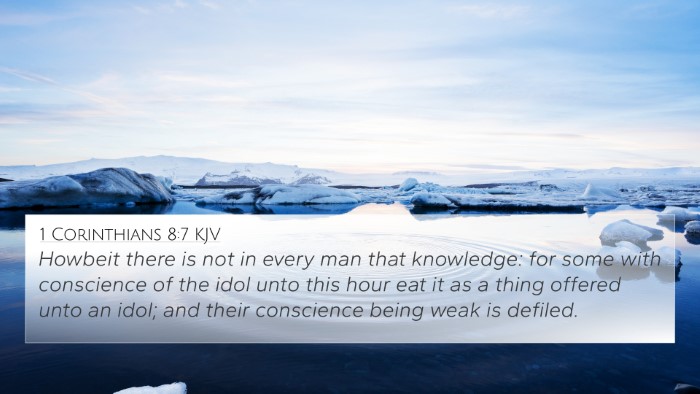
1 Corinthians 8:7 (KJV) »
Howbeit there is not in every man that knowledge: for some with conscience of the idol unto this hour eat it as a thing offered unto an idol; and their conscience being weak is defiled.
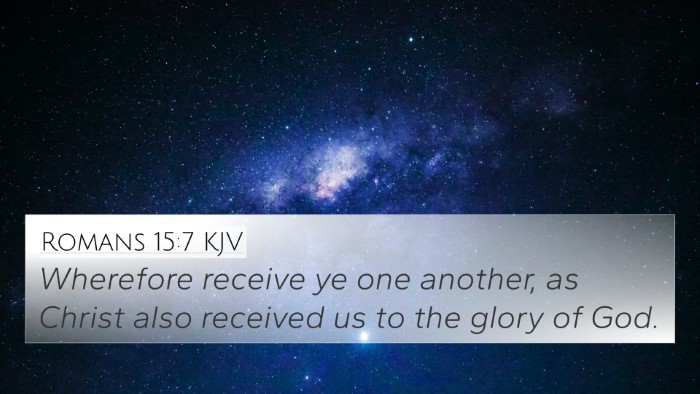
Romans 15:7 (KJV) »
Wherefore receive ye one another, as Christ also received us to the glory of God.

1 Corinthians 9:22 (KJV) »
To the weak became I as weak, that I might gain the weak: I am made all things to all men, that I might by all means save some.

1 Corinthians 3:1 (KJV) »
And I, brethren, could not speak unto you as unto spiritual, but as unto carnal, even as unto babes in Christ.
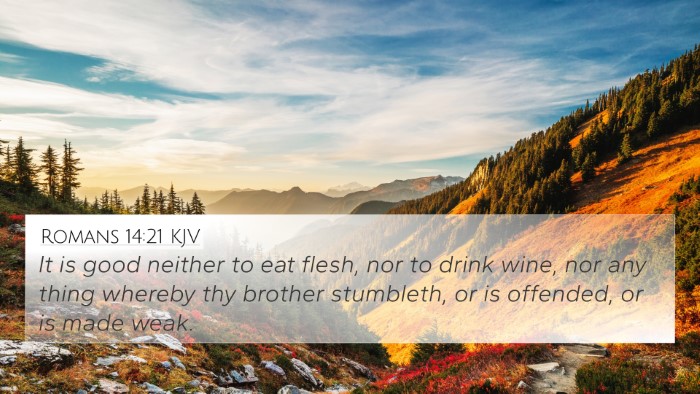
Romans 14:21 (KJV) »
It is good neither to eat flesh, nor to drink wine, nor any thing whereby thy brother stumbleth, or is offended, or is made weak.

Romans 4:19 (KJV) »
And being not weak in faith, he considered not his own body now dead, when he was about an hundred years old, neither yet the deadness of Sarah's womb:

Luke 17:2 (KJV) »
It were better for him that a millstone were hanged about his neck, and he cast into the sea, than that he should offend one of these little ones.

2 John 1:10 (KJV) »
If there come any unto you, and bring not this doctrine, receive him not into your house, neither bid him God speed:

Matthew 12:20 (KJV) »
A bruised reed shall he not break, and smoking flax shall he not quench, till he send forth judgment unto victory.

Matthew 10:40 (KJV) »
He that receiveth you receiveth me, and he that receiveth me receiveth him that sent me.
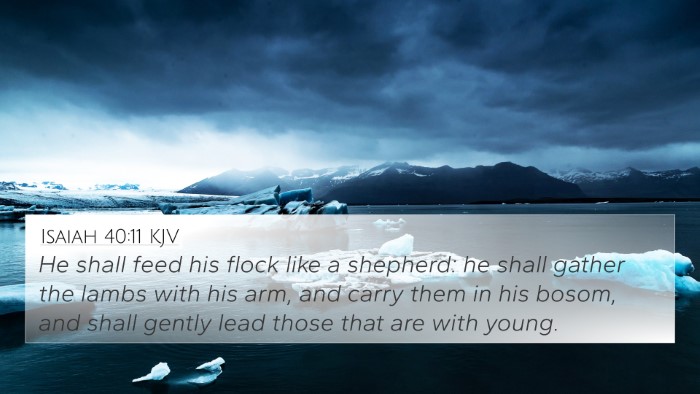
Isaiah 40:11 (KJV) »
He shall feed his flock like a shepherd: he shall gather the lambs with his arm, and carry them in his bosom, and shall gently lead those that are with young.

Isaiah 42:3 (KJV) »
A bruised reed shall he not break, and the smoking flax shall he not quench: he shall bring forth judgment unto truth.
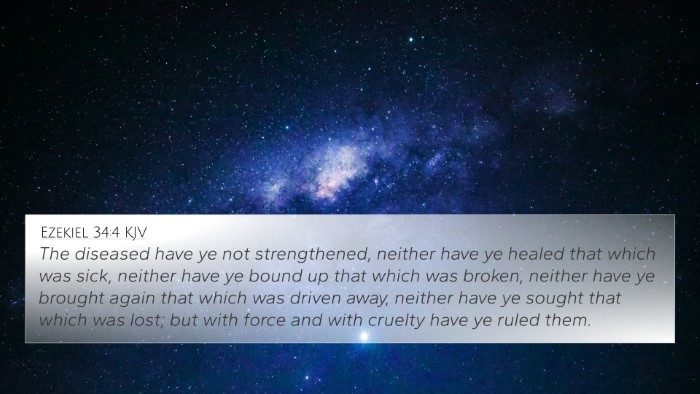
Ezekiel 34:4 (KJV) »
The diseased have ye not strengthened, neither have ye healed that which was sick, neither have ye bound up that which was broken, neither have ye brought again that which was driven away, neither have ye sought that which was lost; but with force and with cruelty have ye ruled them.

Matthew 14:31 (KJV) »
And immediately Jesus stretched forth his hand, and caught him, and said unto him, O thou of little faith, wherefore didst thou doubt?

John 13:20 (KJV) »
Verily, verily, I say unto you, He that receiveth whomsoever I send receiveth me; and he that receiveth me receiveth him that sent me.

Zechariah 11:16 (KJV) »
For, lo, I will raise up a shepherd in the land, which shall not visit those that be cut off, neither shall seek the young one, nor heal that that is broken, nor feed that that standeth still: but he shall eat the flesh of the fat, and tear their claws in pieces.

Philippians 2:29 (KJV) »
Receive him therefore in the Lord with all gladness; and hold such in reputation:

Matthew 18:10 (KJV) »
Take heed that ye despise not one of these little ones; for I say unto you, That in heaven their angels do always behold the face of my Father which is in heaven.

Ezekiel 34:16 (KJV) »
I will seek that which was lost, and bring again that which was driven away, and will bind up that which was broken, and will strengthen that which was sick: but I will destroy the fat and the strong; I will feed them with judgment.
Romans 14:1 Verse Analysis and Similar Verses
Understanding Romans 14:1
Romans 14:1 states:
"Receive one who is weak in the faith, but not to disputes over doubtful things."
This verse addresses the important theme of how believers in Christ are to treat one another, particularly in matters of faith and opinion.
Overall Meaning
The apostle Paul encourages the Roman Christians to accept those who are "weak in the faith." Weakness here refers not to belief in Jesus Christ but rather to the uncertainty or immaturity in understanding Christian liberties, such as dietary restrictions and observing certain days as holy.
Commentary Insights
- Matthew Henry: Henry emphasizes that Christians should be open and welcoming to those who might not share the same convictions on non-essential matters. He notes that it is vital to avoid disputes over these "doubtful things," as they can lead to division within the church.
- Albert Barnes: Barnes highlights the importance of grace and understanding when approaching fellow believers. He indicates that while some may have stricter guidelines regarding faith practices (such as eating certain foods), the core of faith remains the same. The focus should be on acceptance rather than arguments.
- Adam Clarke: Clarke comments on the "weak" in faith, referring to individuals who may not yet fully comprehend the implications of their faith. He stresses that instead of fostering contention, believers should provide support and love to those who struggle with their convictions.
Cross-Referencing Biblical Texts
This verse finds resonance with numerous other Scriptures that emphasize love, acceptance, and mutual respect among believers:
- 1 Corinthians 8:9: “But take heed lest by any means this liberty of yours become a stumblingblock to them that are weak.”
- Galatians 6:1: “Brethren, if a man be overtaken in a fault, ye which are spiritual, restore such an one in the spirit of meekness; considering thyself, lest thou also be tempted.”
- Ephesians 4:2-3: “With all lowliness and meekness, with long-suffering, forbearing one another in love; Endeavouring to keep the unity of the Spirit in the bond of peace.”
- Colossians 3:13: “Forbearing one another, and forgiving one another, if any man have a quarrel against any: even as Christ forgave you, so also do ye.”
- James 4:11: “Speak not evil one of another, brethren. He that speaketh evil of his brother, and judgeth his brother, speaketh evil of the law, and judgeth the law.”
- Philippians 2:3: “Let nothing be done through strife or vainglory; but in lowliness of mind let each esteem other better than themselves.”
- Romans 15:1: “We then that are strong ought to bear the infirmities of the weak, and not to please ourselves.”
Thematic Connections
When linking Bible scriptures concerning Romans 14:1, the overarching theme is unity among believers amidst diversity of belief and practice:
- Maintaining Unity: The advice to receive the weak connects with each believer's responsibility to foster harmony within the faith community.
- Freedom in Christ: Many verses emphasize that while Christians have the liberty to make choices, they must do so while considering the potential impact on fellow believers.
- Cultivating Love: The central command to love one another finds grounding in acceptance and understanding of those who may be less mature in their faith.
- Judgment and Grace: The caution against judging others focuses on the grace afforded to each believer, echoing themes throughout the New Testament.
Conclusion
In Romans 14:1, the call to accept those who are weak serves as a critical reminder of the importance of communal unity and affection. The surrounding scriptures furnish a robust framework for understanding how believers can navigate their differences with grace and support. Cross-referencing Biblical texts, including those from both the Old and New Testaments, enriches this understanding, showcasing the inter-Biblical dialogue that calls believers to embrace their diversity while upholding the central tenets of faith united under Christ.






